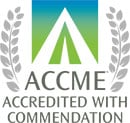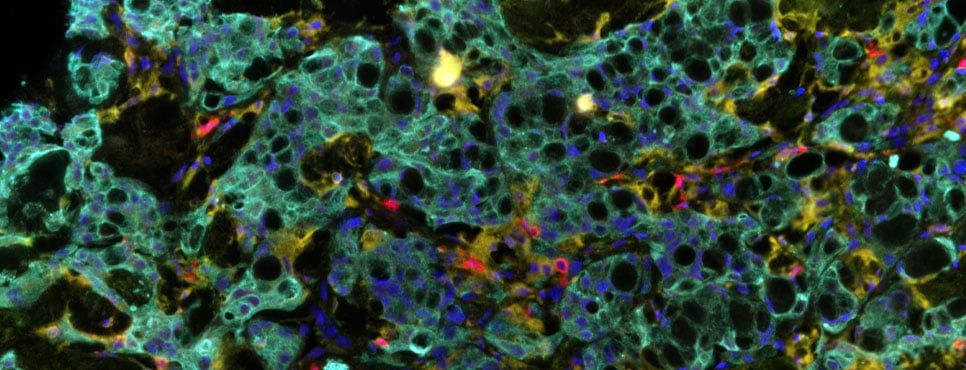Continuing Medical Education
Accreditation Statement

The American Association for Cancer Research (AACR) is accredited by the Accreditation Council for Continuing Medical Education (ACCME) to provide continuing medical education activities for physicians.
Credit Designation Statement
AACR has designated this live activity for a maximum of 18.25 AMA PRA Category 1 Credit(s)™. Physicians should only claim credit commensurate with the extent of their participation in the activity.
Credit certification for individual sessions may vary, dependent upon compliance with the ACCME Accreditation Criteria. The final number of credits may vary from the maximum number indicated above.
Claiming (CME) Credit
Physicians and other health care professionals seeking AMA PRA Category 1 Credit(s)TM for this live continuing medical education activity must complete the online CME Request for Credit Survey by November 17, 2022. Certificates will only be issued to those who complete the survey. Your CME certificate will be sent to you via email after the completion of the activity.

Successful completion of this CME activity, which includes participation in the evaluation component, enables the participant to earn up to 18.25 Medical Knowledge MOC points in the American Board of Internal Medicine’s (ABIM) Maintenance of Certification (MOC) program. Participants will earn MOC points equivalent to the amount of CME credits claimed for the activity. It is the CME activity provider’s responsibility to submit participant completion information to ACCME for the purpose of granting ABIM MOC credit.
To receive ABIM MOC, participants must request MOC in the CME Request for Credit Survey and complete all questions. Once these steps are completed, AACR will submit your completion information via the ACCME’s Program and Activity Reporting System for the purpose of granting MOC points.
Statement of Educational Need, Target Audience, and Learning Objectives
Cancers of the colon and rectum, also known as colorectal cancers (CRC’s), are the third most leading cause of cancer death in the United States. In 2020, approximately 147,950 individuals will be diagnosed with CRC and 53,200 will die from the disease, including 17,930 cases and 3,640 deaths in individuals aged younger than 50 years. In addition to an ageing population and dietary habits of high-income countries, risk factors such as obesity, physical inactivity, and smoking increase the risk of CRC. CRC incidence and mortality rates are also increasing in the young-onset population, with ~12% of cases being diagnosed in individuals under age 50.
Advancements in pathophysiological understanding have increased the array of treatment options for local and advanced disease leading to individual treatment plans. Although these new treatment options have doubled overall survival for advanced disease to 3 years, survival is still best for those with non-metastatic disease.
Current therapies include endoscopic and surgical local excision, downstaging preoperative radiotherapy and systemic therapy, extensive surgery for locoregional and metastatic disease, local ablative therapies for metastases, and palliative chemotherapy, targeted therapy, and immunotherapy. Although these therapies have led to an overall decrease in CRC incidence and mortality, the 5-year survival rate for patients with advanced metastatic CRC stands at about 14%. Diagnosis of CRC at early stages, when it carries a better prognosis, can be difficult because of the lack of obvious symptoms. Therefore, the potential for reducing the burden of the disease by early detection is significant. CRC usually develops slowly, over a period of 10 to 20 years. As the disease only becomes symptomatic at an= advanced stage, organized worldwide screening programs are being implemented which aim to increase early detection, reduce morbidity and mortality from CRC.
While screening has noticeably been shown to reduce the risk of CRC associated mortality, its effectiveness is jeopardized by several factors including the limitations of test performance, lack of accessibility, suboptimal screening compliance, and increasing rate of disease before the recommended screening age, thereby resulting in a marked variation in CRC incidence and mortality globally. Progress in early detection must be linked with improved and novel options for late-stage treatment to increase patient outcomes and quality of life.
This conference will not only place emphasis on the exchange of latest research and therapies among basic scientists, clinicians, translational researchers but will be unique in its consequential interactions between leading researchers in the different thematic areas with established young investigators.
After participating in this CME activity, physicians should be able to:
- Evaluate the utility of novel model systems to inform clinical cancer research and demonstrate potential in biomedical applications, translational medicine, and personalized therapy
- Interpret epidemiologic trends in CRC, data on genetic and nongenetic risk factors, and formulate new approaches for determining CRC risk in young adults
- Establish risk-stratified approaches to CRC prevention and diagnosis, with emphasis on surveillance of high-risk groups
- Identify and assess microbiome contributions to human CRC, and approaches to utilize microbiota markers to identify and better predict those at risk for colon carcinogenesis
- Analyze the inflammatory/immunological responses in CRC and decipher the molecular subtypes of CRC
Disclosure Statement
It is the policy of the AACR that the information presented at AACR CME activities will be unbiased and based on scientific evidence. To help participants make judgments about the presence of bias, AACR will provide information that Scientific Program Committee members and speakers have disclosed all financial relationships they have with ineligible companies whose primary business is producing, marketing, selling, re-selling, or distributing healthcare products or services used by or on patients. All of the relevant financial relationships for these individuals have been mitigated.
Acknowledgment of Financial or Other Support
This activity is supported by Professional Educational Grants which will be disclosed at the activity.
Questions about CME?
Please read our frequently asked questions. If you still have questions, please contact the Office of CME at (215) 440-9300 or [email protected].
